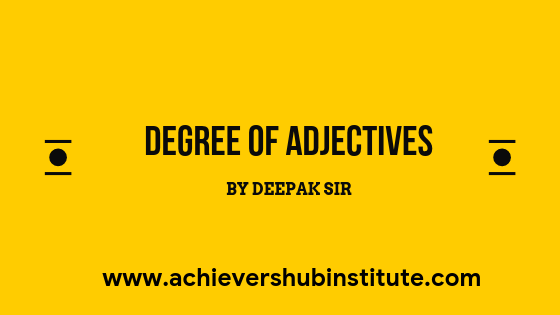
Comparison of Adjectives: Adjectives are the words which tell us about the quality of a noun or a pronoun. Adjectives are one of the important topics of grammar. We have already discussed this topic in our previous articles. Today, we are going to discuss the degree of adjectives / Comparison of Adjectives. We will also give you examples and sentences so that you understand the concept more clearly. In some books, you will find this topic with the name Comparison of Adjectives.
Also Check: Class 10 Footprints Without Feet English Chapter Summary
Degree of Adjectives: English Grammar
In English Grammar, there are three degrees of adjectives.
- Positive Degree
- Comparative Degree
- Superlative Degree
Positive Degree: When there is no comparison and we simply talk about the quality of a noun or pronoun, it is called a positive degree. Examples of positive degree are good, happy, sad, beautiful, clear, smart, intelligent, easy, difficult, etc
Example sentences:
Vartika is an intelligent girl.
She is a cute child.
Raju is a handsome man.
Comparative Degree: When we make a comparison between two or more nouns or pronoun then that is called a Comparative Degree. Examples of Comparative degree are better, happier, smarter, more intelligent, more beautiful, easier etc
Note: We always use ‘than’ while using comparative degree adjectives
Example sentences
Raj is more intelligent than Akshay
Vijay is taller than his father.
In the first sentence, we are making a comparison between Raj and Akshay. We are saying that the intelligence of Raj is more than that of Akshay.
In the second sentence, we are making a comparison between Vijay and his father. ‘Than’ signifies the comparison between Vijay and his father.
Superlative Degree: When we compare a thing or a person with the whole group or the comparison is between more than 2 people then it is called as the Superlative degree. In the superlative degree, we make use of the article ‘the’.
Best, worst, smallest, easiest, cleverest, most intelligent, most beautiful, most handsome, etc.
Example sentences
Akshay is the best student in his class.
Priyanka is the most beautiful girl of her locality.
Ravi is the most intelligent person in his family.
Akanksha is the most popular singer in her college.
Vinay is the best sportsman of his college.
The Himalayas are the highest mountain range in the world.
When to use More and Most in Degrees of Comparison
You must have noticed that in some adjectives we make use of more and most to form the comparative and superlative degree. In general, we make use of ‘er’ and ‘est’ to form the comparative and the superlative. But how do we know that when to use ‘more’ and ‘most’ in degrees of Comparison.
Example: Beautiful has 4 syllables in it. Intelligent has 4 syllables. So the degrees will be like this:–
beautiful more beautiful most beautiful
intelligent more intelligent most intelligent
| Positive | Comparative | Superlative |
|---|---|---|
| Good | better | Best |
| Happy | Happier | Happiest |
| Beautiful | More beautiful | Most beautiful |
| Easy | Easier | Easiest |
| Smart | Smarter | Smartest |
| Little | less | least |
| much | more | most |
| bad/evil | worse | worst |
| intelligent | more intelligent | most intelligent |
| brave | Braver | bravest |
| great | Greater | Greatest |
| bright | brighter | brightest |
| Clever | Cleverer | Cleverest |
| simple | Simpler | simplest |
| old | Older | Oldest |
| white | whiter | whitest |
| Red | redder | reddest |
| faithful | more faithful | most faithful |
| suitable | more suitable | most suitable |
- DAV Class 7 Science Solutions With Explanations: All Chapters - February 6, 2022
- Pollution of Water Question Answers | DAV Class 8 Science - February 4, 2022
- Fabric from Fibre Solutions | DAV Class7 Science Chapter 14 - January 25, 2022

Leave a Reply